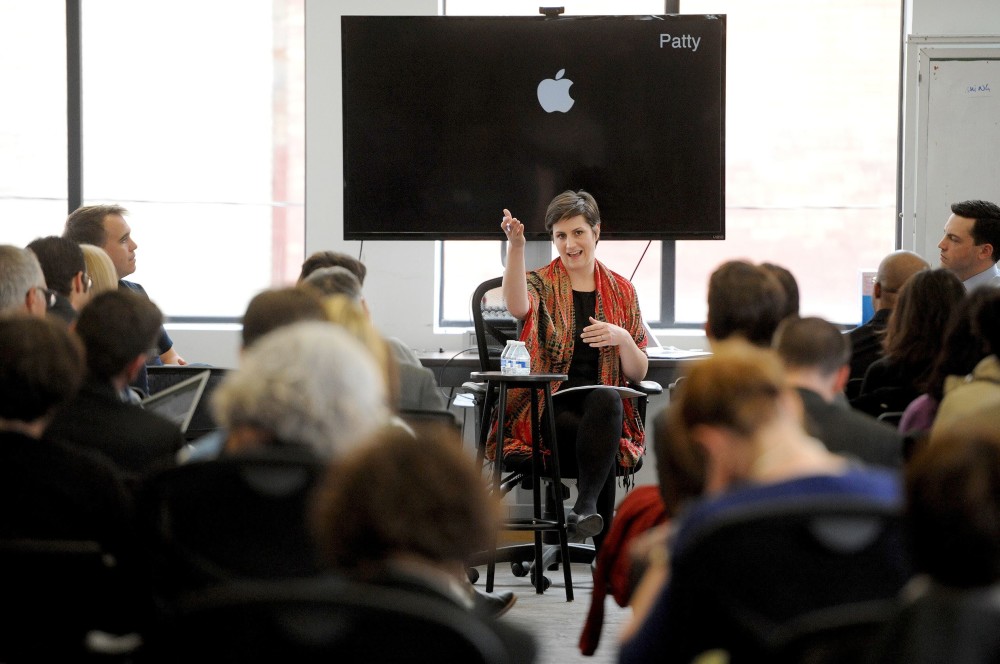By Joyce Gannon
Pittsburgh Post-Gazette.
During an appearance last week at East Liberty business incubator Thrill Mill, Patty Morrissey wore a brightly colored scarf hand-dyed by women refugees in Kenya.
The fashion accessory became an impromptu prop when Ms. Morrissey, former head of social innovation at online deal site Groupon, told the audience she bought it at a holiday bazaar at Groupon headquarters that featured wares from local merchants and social ventures such as an African organization that sells the scarves to support women trying to become economically independent.
For Groupon, Ms. Morrissey noted, the shopping bazaar satisfied a couple of social innovation goals: First, employees had the opportunity to buy locally made or socially conscious products; and second, the event encouraged the Chicago-based company to offer more coupon deals from small, independent vendors and social enterprises.
Social innovation, or corporate social responsibility (CSR) as it is widely known, has evolved into a buzzword that encompasses philanthropy, concern for the environment, safety, ethics and all things sustainable.
Earlier this month, for instance, Apple said it would buy about 36,000 acres of private forest lands in Maine and North Carolina that will be managed by The Conservation Fund and harvested through sustainable processes to provide materials for Apple packaging.
Microsoft, which said annual corporate giving surpassed $1 billion for the first time in 2014, recently ranked at the top of a list of 100 Best Corporate Citizens published by Corporate Responsibility Magazine. The Redmond, Wash.-based software maker’s high-profile CSR initiatives include YouthSpark, free programs that help young people explore career options; and donations of millions of dollars worth of technology services to help emergency responders at global disasters such as the 2013 typhoon in the Philippines.
Whether it’s called corporate social responsibility or social innovation, Ms. Morrissey said it boils down to this: “It’s really baking purpose into the organization. It’s making everyone feel that doing good is everybody’s business.”
At Thrill Mill, Ms. Morrissey was the featured guest at a gathering last week of Next Philanthropy, a new initiative aimed at bringing together for-profit companies, startups, nonprofits and funding firms from throughout the Pittsburgh region to explore ways they can cooperate on social enterprise.
Sponsors include Grantmakers of Western Pennsylvania, Social Venture Partners Pittsburgh, and The Forbes Funds.
“We need to look at social change differently and came up with the Next Philanthropy brand to break down the silos between sectors and try to leverage our resources,” said Elizabeth Visnic, executive director of SVP Pittsburgh.
When Ms. Morrissey joined Groupon in 2010, two years after the company launched, there was no social innovation agenda in place, so her role, she said, “was to make [social responsibility] everyone’s expectation. It was very entrepreneurial. We needed to create the demand.”
Among the programs she developed were Groupon Grassroots, which connects Groupon users with fundraising causes in their own communities such as playground renovations or community gardens; and Love Local, which promotes neighborhood-based businesses.
Love Local was a real “win-win,” she said, because it fulfilled Groupon’s social responsibility mission of supporting hometown enterprises and also generated revenues for the company, which gets a share of the returns generated by each deal posted on its website.
With a bachelor’s degree in psychology from James Madison University and a master’s in social work from Loyola University Chicago, Ms. Morrissey didn’t aspire to work for a big company. Prior to Groupon, her work included counseling, working for a corporate employee assistance program, and running her own firm that designed special events, such as corporate team building or kids birthday parties that featured volunteer activities to benefit community or nonprofit causes.
“I knew I always wanted to change the world,” she said, describing herself at preteen slumber parties “as the one who organized therapy and counseling circles.”
Earlier this month, Ms. Morrissey joined Crisis Text Line, a New York nonprofit that operates a crisis intervention hotline exclusively through text messages.
There she holds the title, director of community, and the job aligns perfectly with her background, she said. “They were looking for a master’s in social work to run it like a tech company.”
Asked what she considered to be models of social innovation, Ms. Morrissey cited drugstore chain CVS Health’s decision to stop selling tobacco products last year.
“Everyone should say, ‘What’s our CVS moment?'” she said.














































































































































































































































































































































































